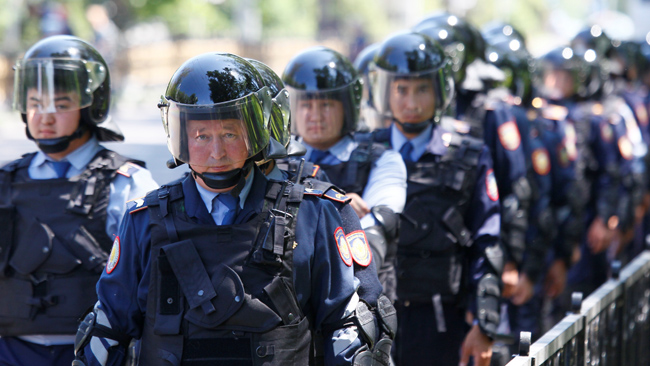“An alarming long-term trend”
Police repelled an attack of gunmen who robbed two gun shops in Aktobe, Kazakhstan
Last Sunday several dozens of unidentified people launched an armed attack and robbed two gun shops at an hour’s interval in the Kazakh city of Aktobe. After killing the seller and some customers and hijacking a bus, the gunmen tried to storm a military unit.
The attack was repelled, but some assailants (27 according to the ministry of the interior) escaped in an unknown direction. This left at least six people dead and 11 wounded. Among the killed are a gun shop vendor, an officer, and a National Guard serviceman. Nine soldiers were wounded. The police and security service detained seven assailants and killed four.
As a result of a special operation in Aktobe, another five attackers were killed, Kazakhstan’s Interior Ministry press service reports. The killed were identified, but their names have not been disclosed. Some of the stolen weapons were seized from the suspected criminals. The ministry says the assailants, “followers of radical nontraditional religious movements,” stole 3 grooved-barrel rifles, 14 smoothbore rifles, 3 gas pistols, cartridges, and knives.
A red terror alert has been declared in Aktobe, the government has postponed the National High School Testing and advised city residents to stay at home. The internet and telecommunications are partially interrupted. Shopping centers, large stores, and entertainment facilities are closed, and the public transport is at a standstill.
Senate Speaker Kassym-Jomart Tokayev said that the Aktobe terrorist act on the eve of the Muslim fast Oraza was a manifestation of extreme cynicism and cruelty of bandits.
The industrial city of Aktobe, about 100 kilometers away from the Russian border, was the site of Kazakhstan’s first suicide bombing in 2011, when a local resident blew himself up in the building of a National Security Committee department.
“THE ROOT IS MARGINALIZATION PLUS CRIMINALIZATION”
Erlan Karin, director of Kazakhstan’s Institute for Strategic Studies, believes that police and security services managed to ward off the worst scenarios of developments in Aktobe. According to the expert, these attacks by gunmen could have paralyzed the work of the police and the authorities as a whole, and cause panic and confusion, but special services did not lose control of the situation and were able to repulse the attack.
“It is clear that the gun shop and the military unit were attacked in order to seize weapons. But they have failed to do so both now and before. Can you imagine what could have happened if they had managed to grab so many automatic weapons?” says Karin on his Facebook page.
“These ongoing events were, to some extent, a question of time. The police and security service were doing their utmost to stave off radicalism, spotting and neutralizing the hotbeds of extremism. But you can’t avert this danger by strong-arm measures alone. We can see again the overall underestimation of the threat – at the level of both the state and society. After 2011-12, everybody seemed to calm down and view the previous events as one-off outbursts. But it is obviously a long-term trend. The root is marginalization plus criminalization. One way or another, the current events will be a new stage in the growing danger of extremism and terrorism in our country. These events are bound to change the overall agenda,” the expert noted.
“THE WEAKENING OF LEGAL OPPOSITION PAVED THE WAY FOR RADICALS”
Dosym Satpayev, director of the Risk Assessment Group, believes that the authorities were constantly lulling the people’s vigilance which is the most important, if not the only, antiterrorist element. “For quite a long time, they rejected the very likelihood of terrorist acts in this country, hyping it up throughout the world as an ‘island of stability.’ Then, after the first acts of terror, they were trying hard to convince us all that it was more about criminality than about an ideology, albeit a false one. At the same time, the legal opposition was being weakened, which paved the way for radicals. Nature can’t stand empty places. In other words, instead of arresting street protesters and conjuring up the picture of ‘maidans,’ the authorities should have been catching real extremists who turned out to be the ‘fifth column’ about which some pro-governmental media like to argue so much. These people are sure not to ask for permission to hold any kind of a rally. Therefore, by actively weakening the intra-system opposition which tried to work obeying the law and could have drawn a part of protest sentiments, the government in fact failed to see the emergence of anti-system opposition among local radical groups. And they are making their presence felt over and over again, which is an alarming trend,” the expert emphasizes on his Facebook page.
Newspaper output №:
№37, (2016)Section
Topic of the Day





